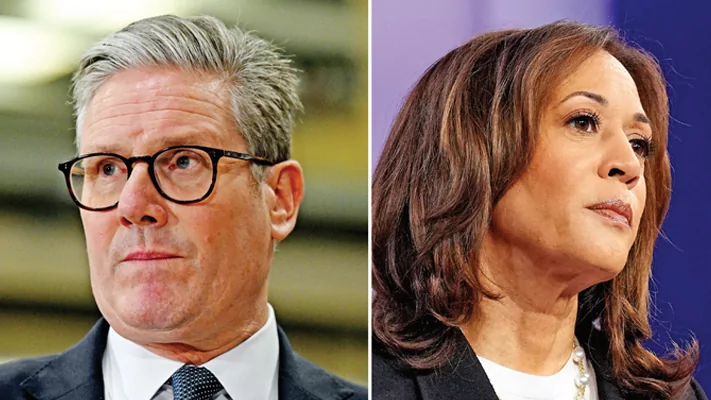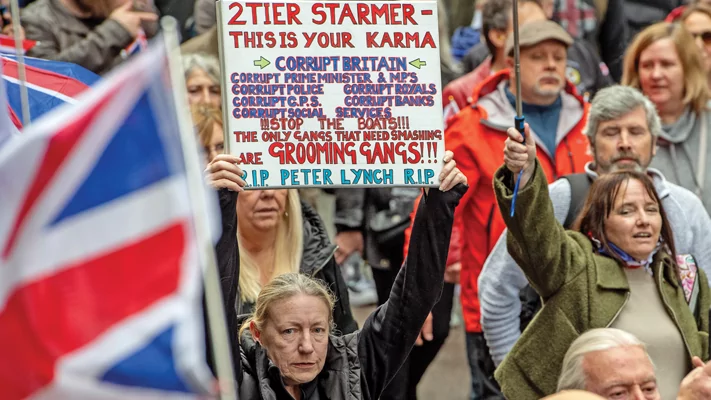The new president was an ex-prosecutor with a middling record and a trail of dubious judgments. He ran a negative campaign that emphasized the flawed personality of the opponent and masked his own poor record. He had entered politics late and risen to the middle through personal connections, then secured his party’s nomination in a coup. He was a placeholder, pushed by shadowy funders who overruled the party members. His personality was a vacuum, a negative field of charisma. He had no political skills at all, apart from a willingness to reverse his position on any policy at any moment. He would be in power for years, long enough to change the country for good — or bad.
None of his close advisers had ever won an election. Most of them came from the publicity-averse fields whose business is publicity or from businesses that don’t like publicity. They were “advisers” whose advice remained secret or media managers who kept their names out of the media or friends with benefits such as fundraising connections who didn’t want to talk about it.

His circle had perfected the theatrics of opposition. They had no idea how to govern. This was to be expected. The president was an amateur who neither knew nor liked his electorate, so he felt most comfortable among like minds. But the professional politicians couldn’t govern, either. Most of his Cabinet appointments were veterans of the party’s previous stint. Perhaps that was the problem. They knew what they thought. They thought they knew how to govern. They were career politicians, so they refused to reflect on their previous mistakes. They were progressives, too, so that gave them something to look forward to.
The new government picked up where it thought it had left off. But somehow, it failed to gain traction. The federal bureaucracy had abandoned its pretense of neutrality and now did everything it could to help the party, but even this seemed not to help. The government had a policy for everything, especially on its favorite topics: gender, race, colonialism, iniquity of the past. Often, it had two policies, one technocratic liberal, the other utopian socialist, because the party’s leadership was at odds with its membership and its supporters in the media. The only point of agreement between the three groups was that all problems are political, so all iniquities can be converted into equities by policy statements and public spending.
The policies never took political form. One of the curious things about the president was that he had campaigned as both the candidate of continuity who would restore an increasingly elusive “normality” and also as the candidate of “change.” No one knew what he really thought. Perhaps his thinking was purely political in the instrumental rather than the democratic sense, a logic of laws and bureaucracy whose execution required either overriding opposition in the name of the general good or retraining a recalcitrant public to drop its sentimental (and, let’s face it, cryptically racist and sexist) affection for traditions of constitutional government. Perhaps his lack of conviction and the general decay of political thinking in his lifetime had led him to stumble into the purest form of politics, the pursuit of power for its own sake. But he was not surefooted enough to be a Machiavelli.

The markets knew it and started to bet against his economic policies. The Chinese knew it and kept on nudging the United States out of Eurasia. The Russians knew it and stepped up the war in Ukraine. The Iranians knew it and kept on attacking Israel while their proxies flung rockets at American ships in the Red Sea. The human traffickers and drug smugglers knew that the border would stay open. The police knew that the government did not have their back. The Islamists knew that the party thought it needed them and continued to burrow into the federal bureaucracy.
This was the wrong kind of continuity. Even the people who had voted for the new president could not accept that perpetual decline at home and a slow slide into war abroad was now normal. An electorate that had voted in haste prepared for four long years of economic waste, rising crime, race-baiting, broken borders, radicalism in the schools, terrorism in the streets, cross-dressers in the women’s toilets, and endless nannying lectures about diet and exercise. Within 100 days, the new president had the worst poll numbers yet. An authoritarian who had lost his authority, he looked stricken before the cameras, incapable of connection or communication.
The news was so bad and the public’s anger so palpable that the government redoubled its commitment to suppress “disinformation” and break the independence of social media, especially X, because the government, though it could always understand the motives of illegal immigrants who committed horrific crimes, could not understand why Elon Musk insisted on biting the hand that feeds. Over the next four years, the president secured his place in history as the man who silenced free speech, forever.
Promises, promises
The person in question is not Kamala Harris. It is Sir Keir Starmer, the Labour Party leader who became Britain’s prime minister last July. The parallels between Harris and Starmer are uncanny. Both of them are ex-prosecutors, imposed on their parties against the will of the members. Neither has any charisma nor any scruple about reversing policies. Neither can state the biological truth that there are two sexes or the political truth that a state that cannot secure its borders is on its way to ceasing to exist as a nation.
Neither of them is much troubled by that. They are anti-democratic in that they want to exclude the demos (the people) from the kratos (political rule). Post-national politicians, they believe that political legitimacy does not rise up from the democratic will of the people but descends as a legal matrix from international institutions. Both struggle to express themselves. Harris is an accomplished tosser of word salads. At the Labour conference in September, Starmer called on Hamas to “free the sausages.” He also called on Israel to stop fighting for survival. Both he and Harris lead parties that serve as the thin edge of the Islamist campaign to expel Jews from public life and home and isolate Israel as a prelude to its destruction.

Harris and Starmer are liberal authoritarians: liberal about a narrow list of approved lifestyle options, authoritarian in suppressing any opinion or behavior that is off the list. Both are committed to suppressing free speech. They melt under pressure from their parties’ “activist” allies (transexual fetishists, Islamists, socialists, mongers of racial grievance and environmental catastrophe, Ivy League professors, and other sensitive types who get angry when people speak back). They are happy to be pressured and glad to melt. They have spent their entire life in a bubble of like and similarly softened minds and genuinely believe that all political questions are settled, including the question of their personal “complicity” in any and all iniquities. All objections must be on the “far Right,” “racist,” or, worse, “transphobic” and “Islamophobic.”
If you want to know what the U.S. will look like under a Harris presidency and how quickly its incoherence and opportunism will sour, you need only look at the fiasco of Starmer’s first months in office. In late October, a YouGov survey found that Starmer’s approval rating had fallen by 47 points to 34%. It is 40 years since an elected prime minister fell from public favor so fast and so precipitously in his first 100 days. Even Rishi Sunak, the hapless Conservative whom Starmer defeated last summer, did better than that. Only Sunak’s unelected predecessor, Liz Truss, did worse, and she didn’t last 100 days.
The decline in Starmer’s support has been sharpest among those who elected him in July. Approval among Labour voters has fallen from 77% after the election to 27%. This is the worst case of buyer’s remorse in British electoral history. It is so extreme that Sunak, who as Boris Johnson’s chancellor of the exchequer drove Britain’s debt-to-GDP ratio to nearly 100%, has actually risen 5% in the public’s estimation since losing the July elections.
Sunak may have spent all the money on COVID-19 subsidies, but at least he understood how to spend it. Another regular survey, this one with the ironic name of the Economic Optimism Index, found that optimism about Starmer’s ability with a pocket calculator has declined by 21% since July. The only prime minister in the last 25 years to inspire less confidence was David Cameron, whose Conservative government imposed “austerity” cuts to clear up after the 2007-08 fiscal crisis. Starmer and his ministers now advance a Cameron-style defense.
Cameron insisted, with good reason, that the previous Labour government had overspent, sold off much of Britain’s gold reserves when gold was at a historic low, and pushed the public debt to levels that might capsize the pound. Labour now claims that the coffers are empty because Truss “crashed the economy” in her brief 2022 premiership, leading to price rises and high inflation. True, the markets sharply rebuked Truss’s plans to jump-start the economy by cutting taxes without cutting spending. But price rises and high inflation were global.
The COVID-19 shutdowns interrupted supply chains everywhere. A binge of money-printing and subsidy created massive public debt everywhere. The policy cure, a controlled surge of inflation and a tightening of fiscal belts, was adopted everywhere, except in the U.S., where the money-printing never stops. Truss didn’t help, but Britain’s economy was especially exposed to this roller coaster. Britain’s finance ministers must thread a path for the pound between the dollar and the euro, but the three currencies didn’t go through the inflation-deflation phase in precise sync.
Labour campaigned on promises that its spending plans were fully costed and would not require raising taxes. After the election, Starmer announced the discovery of a 22 billion-pound “black hole” in the public finances due to Conservative overspending. The independent Office for Budget Responsibility estimated it at 9.5 billion pounds. On Oct. 30, Starmer Chancellor of the Exchequer Rachel Reeves announced the biggest tax-raising budget since 1970. The Conservatives’ 2010 austerity budget intended to raise tax revenues by 14.9 billion pounds. Reeves’s budget aims at squeezing 40 billion pounds from the private sector.
The government that says it is for “working people” has raised employment taxes and income tax, which as Reeves admitted will depress business profits and wage growth. With a Scrooge-like lack of charity, it has cut winter fuel subsidies for the elderly. It has imposed a 20% sales tax on private school fees to punish those who work hard and save. Yet it has added 23 billion pounds to its departmental expenditure limits for 2024-25. The OBR estimated that these billions will push economic growth to 2% in 2025, after which growth will decline.
Like the Democrats, Labour sees private enterprise as a cash cow serving an ever-expanding public sector. But private enterprise is closer to a golden goose. Corporatism and clientism will kill it. The Labour government has betrayed its promises to the voters and committed itself to high taxes, high spending, and low growth. The “working people” will bear the brunt of this. They are already on the sharp end of other Labour failings that sound like foretastes of a Harris administration.
Two-tier keir
Britain’s jails are full for the same reason that it faces a shortfall in energy supplies. Successive governments have failed to keep up with demand. Labour’s answer to the energy supply problem is a dwarfish impersonation of the Democrats’ Green New Deal. Labour’s answer to prison overcrowding is to reduce the threshold for parole. So far, the freed prisoners include domestic abusers and even people who have played a part in murder.
“I’m a lifelong Labour voter now!” Djaber Benallaoua, a 20-year-old drug dealer, told the Daily Mail after his early release. Asked about his plans, he said, “I’m gonna get lit.” Daniel Rutuls, a 19-year-old convicted of aggravated burglary, concurred that from now on he will be a “100%” Labour voter. He commended Starmer for “a smart decision,” noting that “now you’ve got more space.”
Some of those spaces have already been filled. On July 29 in the northern town of Southport, a man murdered three little girls and wounded 10 more people, eight of them children, in a stabbing rampage at a Taylor Swift-themed party. Protests and riots broke out in the town and spread across the country. Starmer immediately accused the “far Right” of instigating the riots. He and his ministers called for maximum sentences for spreading what they called “disinformation” about the attacker being Muslim or an immigrant, legal or illegal, and for tighter speech controls, especially on social media. The police identified the killer as “Welsh.” When they admitted that he was Axel Rudakubana, the son of Rwandan immigrants, the media emphasized that Rwanda was 98% Christian.
Lucy Connolly, a 41-year-old child care worker with no previous convictions, broke British law against racial incitement by calling on X for “mass deportation now” and suggesting that people could “set fire to all the f***ing hotels full of the [migrant] bastards for all I care.” She deleted the post after 3 1/2 hours. She is now serving a 31-month jail sentence. Compare her treatment to that of the pedophile BBC newsreader Huw Edwards. In September, Edwards received a six-month suspended sentence for soliciting images of child sexual abuse.
The day before Reeves announced her budget, the police announced that Rudakubana was being charged with possessing an al Qaeda manual and making ricin, a chemical weapon. At the very least, public speculation about Islamist motivations turns out to have been well founded. The police would have found Rudakubana’s terrorist materials within hours of the attack. If Starmer and his Cabinet were not informed, that is a scandal. If they were informed and then withheld the information from the public, that is a scandal.
CLICK HERE TO READ MORE FROM THE WASHINGTON EXAMINER
This is not the only scandal dogging Labour. Starmer and his ministers have been caught accepting “freebies” from donors: concert tickets, flights, and holidays. Lord Waheed Alli even paid for the clothes on Starmer’s back and secured a security pass to No. 10 Downing St. Alli has previously called for tighter controls on the press.
A party that divides the people into “allies” and enemies will govern with a two-tier justice system. The bias will be so clear and unethical that the public will object. The government will then become a censor, suppressing free speech. It will use exemplary punishments to intimidate the law-abiding while indulging its favored clients. It will blame the victims and shoot the messenger or invent specters of the “far Right” and “fascism” to justify further suppression. The British have chosen four more years of this and are now repenting at leisure, but in private in case they are prosecuted. Americans still have time to choose a different future.
Dominic Green is a Washington Examiner columnist and a fellow of the Royal Historical Society. Find him on X @drdominicgreen.























